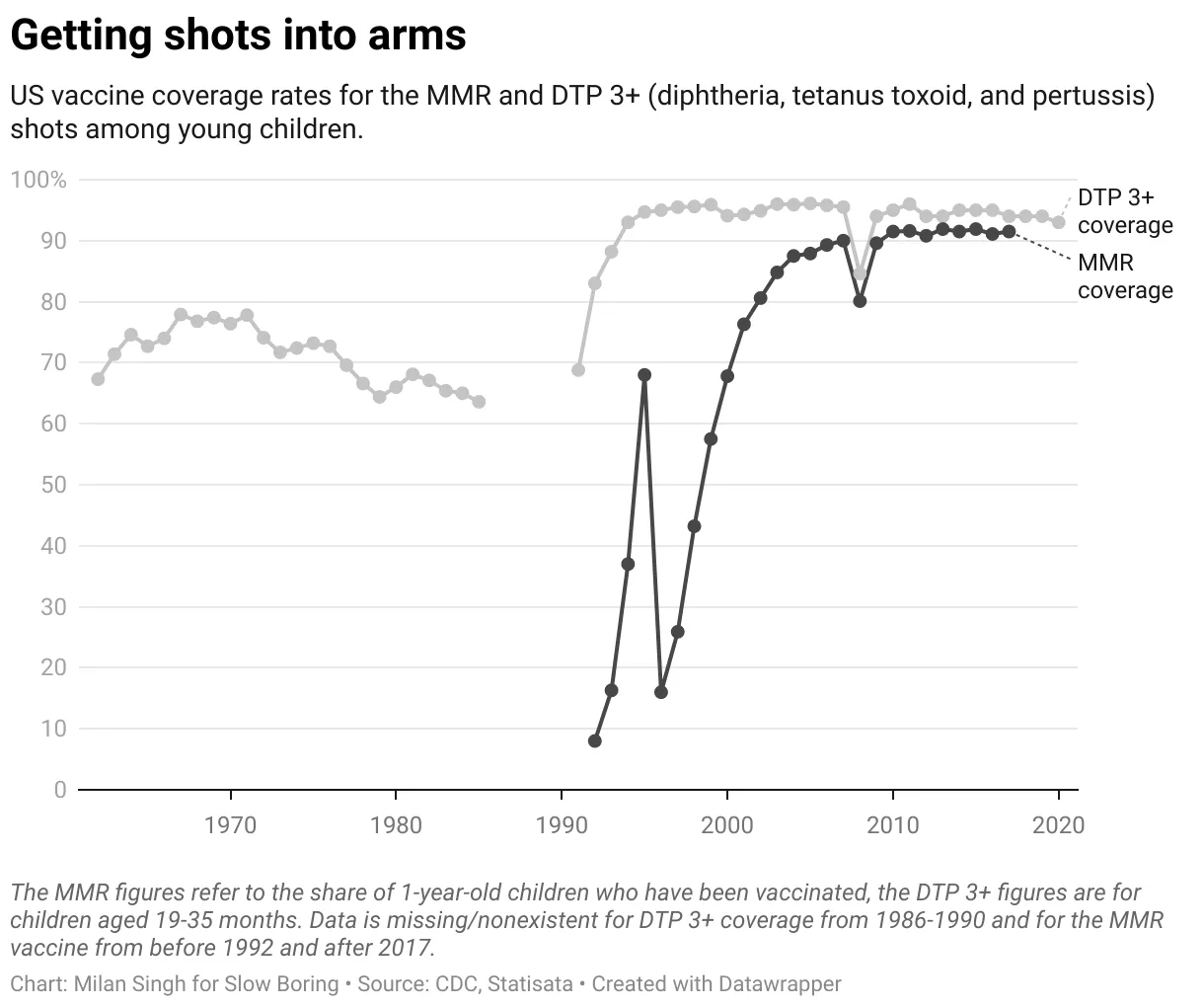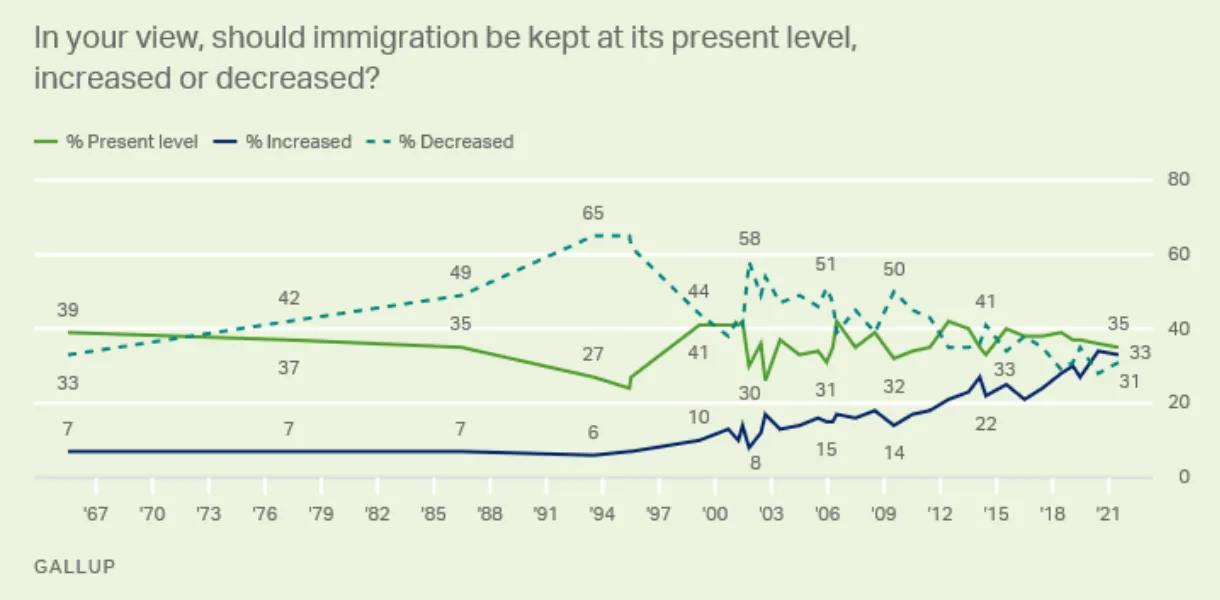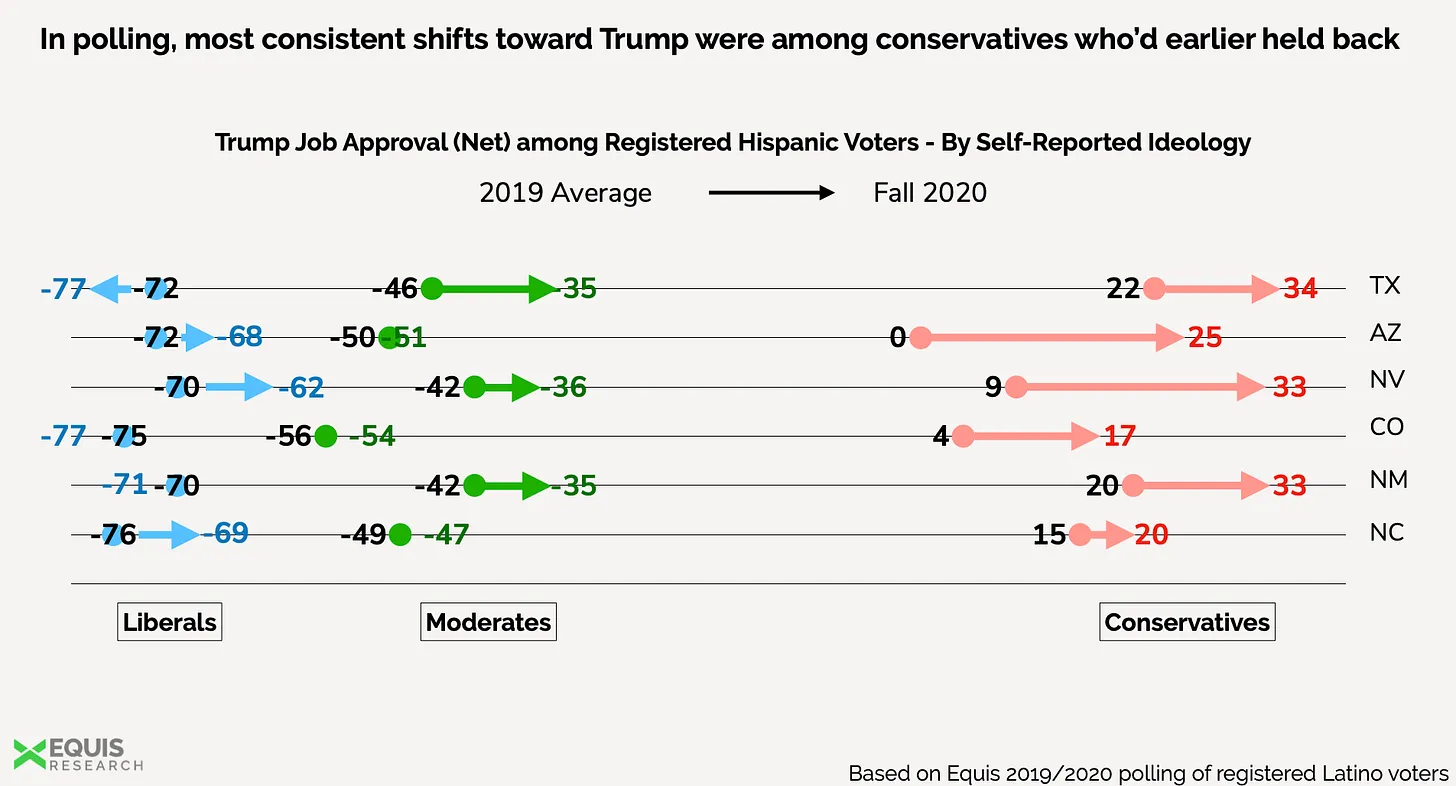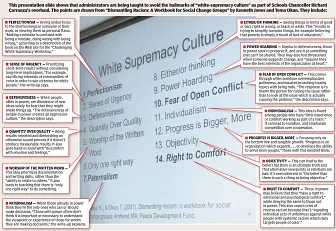

Discover more from Slow Boring
The "misinformation problem" seems like misinformation
If anything people have become better informed
People are often misinformed about things. Sometimes they obtain that bad information from false or misleading media coverage; sometimes that media coverage is deliberately false. And there’s a fine line between media coverage that seeks to frame issues appropriately and coverage that’s propagandistic.
All of this is bad.
Propagandistic media coverage is bad, spreading false information deliberately or carelessly is bad, misleading people is bad, and it’s unfortunate that voters (and, frankly, elite policymakers) often make important decisions operating under misconceptions.
That said, I do not think there is much evidence that misinformation has become more widespread, that this increase in misinformation is due to technological change, or that it is at the root of the political trends liberals are most angry about. If anything, people seem to be better-informed than in the past — which is what you would expect because our information technology has gotten better — and it is very hard to think of any cure for misinformation that would not be worse than the disease.
The internet makes me better informed
Accusing other people of being misinformed is easy since the stupidity of others will always be more evident than our own blind spots.
But personally, I really do think the internet makes me a lot better-informed than I was when I was in high school in the 1990s. And I don’t think that’s just because I was in high school; I was a young politics dork who read The Economist and small political magazines in the school library during free periods.
Thanks to the internet, I now can and do:
Read many abstracts of new academic research, read some actual papers, and maintain a vast storehouse of links in case I ever decide to write on a particular subject.
Directly access think tank output on policy issues, as well as the running commentary from think tankers and university scholars on the issues that they study.
Read Canadian news coverage of interesting events that occur in Canada and UK news coverage of interest events that occur in Britain. Through the magic of Google Translate, even German-language coverage of German politics is pretty accessible.
Look up anything I’m curious about. Recently I wondered if the government of Slovakia takes a pro-Russian stance (because the prime minister is a right-wing populist and right-wing populists are often pro-Russian) or a pro-Ukrainian stance (because Central European nationalists are often anti-Russian). I quickly learned that Eduard Heger is pro-Ukrainian. I also found out that U.S. industrial production has recovered to its pre-pandemic level, but that the pre-pandemic level itself represented a small decline from the actual peak in the summer of 2018.
It’s amazing that I can do all of that, and it makes me better informed. Of course, this is my job. Most people have other things to do with their time and perhaps less of an inclination to take advantage of the internet’s bounty of information. But I am not the only journalist who is able to take advantage of the internet.
Another thing I look up on the internet from time to time is contemporaneous newspaper coverage of old policy debates, and the quality of the coverage is just awful by today’s standards — but not because the journalists covering the 1990 budget deal were idiots. They had to work with analog reporting methods: they had very limited ability to put charts in their stories, and they had no ability whatsoever to link out to more detailed analysis that would let readers dive deeper into some point of detail. Modern journalists are better-informed and they create more informative journalism, which makes you more informed as a reader — and you’re not the only one.
People seem mostly better informed
Also thanks to the internet, I can look up whether it’s true that people have become more misinformed over time.
And on the basics of civic life, that doesn’t seem to be the case. A survey from the Annenberg Public Policy Center found that in 2006, only 33 percent of people could correctly identify the three branches of government. By 2021, that was up to 56 percent. That’s way higher than 33 percent! It’s also a powerful reminder that a huge share of the population doesn’t pay any attention at all to politics and government. A broader survey of political knowledge from the American National Election Survey shows no change in civic awareness except perhaps a small rise since the 1990s in knowledge of which party controls the majority in Congress.
Both of those seem consistent with the idea that politics has gotten more polarized and high-stakes, with more people paying attention.
Joseph Uscinski, a political scientist who literally wrote the book on conspiracy theories, painstakingly cataloged old letters to the editor and found a fairly constant level of conspiracy theorizing in them for over a century.
Brendan Nyhan, another political scientist who studies misinformation in detail, writes in one of his papers that “no systematic evidence exists to demonstrate that the prevalence of misperceptions today (while worrisome) is worse than in the past.”
My favorite study about how Facebook is bad finds that it follows what you’d essentially call an addiction or compulsion paradigm. If you give people a cash incentive to turn off their Facebook account, they spend more time watching TV but also more time socializing with friends and family. This leads to an increase in their subjective well-being (i.e., they’re happier) and generates “a large persistent reduction in post-experiment Facebook use.” In other words, people struggle to go cold turkey. But once they do, they generally like it. So what about misinformation? It turns out that getting offline “reduced both factual news knowledge and political polarization.”
I tend to think that a lot of what is going on is that people see the internet increasing polarization — more people are fighting about politics and saying things they think are really dumb — and confusing that with people being misinformed.
Cranks often know a lot
When I went on The Joe Rogan Experience in early December of 2020, he surprised me by veering way off-topic to do vaccine-skeptical takes.
Since this is not what my book is about and isn’t something I had professional background covering, I was not prepared to rebut his talking points effectively. That’s especially true because, at the time, the Covid-19 vaccines were loosely Trump-branded, so I wasn’t really expecting this to be a controversial issue and hadn’t looked into it. Which is just to say that Rogan was actually much better informed about the vaccine issue than I was. He (correctly) said the common, non-severe side-effects were considerably worse than I realized. And he also correctly said that the Phase III clinical trials were not long enough to gauge how enduring the protection the vaccines offered was. He, as a vaccine skeptic, had sought out a lot of vaccine skeptic talking points, and many of those talking points were factually true.
I, a normal sane individual who supports vaccination efforts, never bothered to look into anything about it other than when was I going to be able to get my shots.
But this is actually the general pattern in life. A normal person can tell you lots of factual information about his life, his work, his neighborhood, and his hobbies but very little about the FDA clinical trial process or the moon landing. But do you know who knows a ton about the moon landing? Crazy people who think it’s fake. They don’t have crank opinions because they are misinformed, they have tons and tons of moon-related factual information because they’re cranks. If you can remember the number of the Kennedy administration executive order about reducing troop levels in Vietnam, then you’re probably a crank — that EO plays a big role in Kennedy-related conspiracy theories, so it’s conspiracy theorists who know all the details.
More generally, I think a lot of excessive worry about “misinformation” is driven by the erroneous belief that more factual information would resolve political disputes. Both David Neumark and Arin Dube know far more than you or I do about the empirical literature on minimum wage increases. Nonetheless, they disagree. It is simply a heavily contested question. Relative to Neumark, the typical progressive is wildly misinformed about this subject; relative to Dube, the typical conservative is wildly misinformed. And lots of political disputes have this quality — most people don’t know that much about it, but you can find super-informed people on both sides of the question. That’s why it’s a live debate.
Anti-vaccine sentiment isn’t new
When I asked Twitter followers to suggest the best evidence they had that misinformation has become worse than it was 30 years ago, a lot of people expressed their frustration with the people who won’t get Covid-19 vaccines. I also find this extremely frustrating.
That said, vaccination rates for kids have actually risen since the mid-1990s, even as the number of recommended shots has increased. I think that is probably mostly due to SCHIP and Medicaid expansion putting more children in regular contact with a healthcare provider than with anything to do with media coverage. But that in turn is a reminder that the focus on social media is probably a mistake.
A lot of people know that the licensing of the polio vaccine in the 1950s was widely greeted with celebratory headlines and the ringing of church bells. A lot of people also know that as part of a pro-vaccination effort led by the March of Dimes, Elvis Presley got vaccinated on camera for the Ed Sullivan show. What I think a lot of people don’t know is that the announcement came on April 12, 1955, and Elvis went on TV in October of 1956. Eighteen months after authorization, vaccine uptake was still slow, and that was after a much longer development process.
More broadly, I think we shouldn’t get cause and effect backward in terms of the media and anti-vaccine sentiment.
In the case of Covid-19, we actually had pretty powerful early validators in the form of Mitch McConnell and Donald Trump. But every time Trump talks about vaccination in a positive way, that seems to generate a negative response from his core audience. That dissuades him from doing it. Trump, allegedly, is an aspiring statesman, so I think it’s fair to say that he should do more to help push good information onto his people even if it costs him.
But in terms of the media, I think it’s much more likely that people are seeking out anti-vax content than that they are being brainwashed. There is fundamentally no way anyone could be unaware that the bulk of public health and medical professionals say the vaccines are safe and effective. The anti-vax stance isn’t misinformed about this reality; it simply asserts that public health and medical professionals are bad and you shouldn’t listen to them.
Just as the people who voted for Trump in 2016 were surely aware of the fact that most credentialed people in America felt he was a bad choice.
Trump and misinformation
Donald Trump is a huge liar, which generates a natural affinity between complaints about Trump and complaints about misinformation.
But I think this is fundamentally misguided on a number of levels. The 2016 election generated a lot of discussion of “fake news,” but the evidence suggests that a relatively small group of people constituted the bulk of the audience for fake news and that those people were mostly very right-wing. By contrast, lots of people who were not particularly right-wing read the New York Times’ wall-to-wall coverage of the Hillary Clinton email saga, which generated more television coverage than all policy issues combined. But critically, that email-centric coverage wasn’t “misinformation.”
There really was an FBI investigation into Clinton’s email server. She really did violate federal policy about email usage. There really was a re-launch of the investigation after new copies of already-reviewed emails were discovered on her laptop. The coverage was disproportionate and absurd but not false, and it appeared in very traditional outlets.
Meanwhile, if you want to somehow blame zany internet stuff for Trump's ability to win, I think you need to grapple with the fact that the overall political climate was much more right-wing in the 1990s. Bob Dole wanted to kick the U.S.-born children of undocumented immigrants out of public school, which is further than Trump ever went. Trump’s positions on immigration were covered as more extreme than Dole’s because mass opinion is less hostile to immigration than it was in the nineties.
But American politics has been shifting leftward for years.
I know some people find that absurd. But imagine if Kevin McCarthy gave a speech this week where he said “after we retake the House this fall, we’re going to fight against wokeness by kicking gay soldiers out of the military and curb inflation by privatizing Social Security and cutting Medicaid and K-12 school funding.” That would be the best news the DCCC and DSCC have heard in years! But it would just mean McCarthy was reiterating his support for Paul Ryan’s policy ideas from 10 years ago. Meanwhile, Biden’s positions on virtually everything are at least a little bit to the left of Obama’s.
So people vote Republican, I think, not because of “misinformation” but because they perceive that the GOP position on many policy topics has moderated while the Democratic Party’s has gotten more left-wing. I think it’s very possible that the perception of Republican moderation is, in fact, a mistake and that their next trifecta will return to hard austerity and welfare state rollback. But the idea that they won’t isn’t “misinformation” in the sense of bad Facebook memes; it’s reflective of the parties’ current arguments and of mainstream coverage of those arguments.
I do think Republicans are misleading people about their economic policy agenda, but this is an extremely not-new phenomenon (remember the Bush tax cuts or Ronald Reagan’s whoppers about welfare queens).
Truth is a moving target
Beyond being overstated, I worry that misinformation panic could, over time, make discerning the actual truth harder.
A big part of my job is trying to understand what the credentialed experts are saying and where the consensus is. But as anyone who’s paid attention to Covid-19 knows, the consensus shifts. Masks were bad, then they were good. You were supposed to emphasize the utility of even cloth masks to the point where I think we clearly overshot the mark and underemphasized the value of a high-quality mask. Trump’s vaccine development timeline was too optimistic, but then it turned out to be correct. Then the vaccines were more effective than the consensus thought they’d be. But then immunity turned out to wane faster than the consensus said it would. Boosters went from unnecessary to obligatory in a blink of an eye. Thirty months ago, only right-wing cranks said the FDA is too hesitant to approve new drugs. Now it’s in Vox, and the right-wing crank view is that the FDA is too permissive.
I think dumbass populists look at this and go “aha! the experts are all a cabal of liars and we can ignore them in favor of whatever batshit conspiracy theory we like!”
But rejecting the consensus opinions of qualified experts is not a personality, it’s a grudge. It doesn’t give you answers because it doesn’t tell you in what direction the error was made. During the depths of the Great Recession when the establishment was catastrophically under stimulating the economy, there was a mania for Rand Paul’s argument that the Fed’s policies were dangerously inflationary. But that whole experience created too much complacency, and now we really do have inflation.
I think the only sensible thing to say about all this is that discerning the truth is hard, and it requires debate and dissent. Functional expert communities and well-run journalism institutions are open to new information, to changing their minds, and to correcting the record. But that process doesn’t work if the fact-check squad slaps a “misinformation” label on you for saying the CDC is wrong about masks.
As Tyler Cowen wrote last week, it does seem like our overall level of public health knowledge is improving rather than getting worse. People take the health risks of smoking much more seriously, and compliance with seatbelt rules is high even though practical enforcement is weak. And, yes, seatbelt mandates were very controversial when they were first introduced, and it took years for an idea that launched in New York State to be more broadly accepted.
Information and polarization
The thing that really has increased is polarization and the accompanying “everything is about everything” totalizing political conflict.
New York was the first state to mandate seatbelts, and it was a somewhat liberal-coded idea. But the bill was spearheaded in the New York State Legislature by a Republican. There used to be tons of moderate Republicans in northeastern state legislatures, and this kind of public health measure that didn’t touch on the core of distributional politics was exactly the kind of thing they liked to make centrist gestures on. And U.S. Transportation Secretary Elizabeth Dole seemed to take a fairly technocratic view of the topic. At the same time, Democrats in other states did not face immediate pressure to make this a uniform partisan view. There was just much more looseness to overall conflict.
By the same token, we had plenty of conspiracy theories in the past, but they weren’t as clearly aligned with partisan politics.
But it’s worth saying that polarization seems more likely a consequence of good information than bad. In times past you’d expect someone like Steve Bullock — a locally popular guy who’d won several statewide races — to win a Senate seat in a strong year for Democrats, even as Joe Biden lost his state. His problem is that today’s voters have a more sophisticated grasp of the structure of national political conflict and know that a Bullock win would, in practice, empower progressives who most Montana voters don’t like.
Similarly, while liberals make a big deal out of “misinformation” as a factor in the rightward shift of Hispanic voters in 2020, what Equis Research (among others) find is that the Trump shift was concentrated among self-described conservatives.
Polarization, in other words, is largely a question of people becoming more sophisticated about American politics. People vote less on the basis of ethnic identity or “Steve Bullock seems like a nice guy” and more on the basis of ideological alignment.
This creates a lot of very real problems for a political system that is not built to operate with highly organized, highly ideological political parties. But misinformation doesn’t seem to be a significant contributor to it. If anything, things are getting harder because information has gotten better.
Subscribe to Slow Boring
Passion and Perspective from Matthew Yglesias










Wishful thinking drives much of the focus on misinformation. It's unpleasant to be disagreed with. It shows people don't share your values, or heaven forbid, that you might be wrong. Misinformation evades that unpleasantness. People don't really disagree with you, they're just misinformed.
It's part of the broader "politics as entertainment" problem. If your top priority is to win elections and enact policy, there's an obvious downside to implicitly labelling as stupid those who disagree with you, and whom you need to persuade to cross to your side. But if you're just trying to feel good about yourself, it's great.
I think a lot of the misinformation panic comes from the kind of techno optimism that a lot of people lived in in the 90s and 00s. That good information would drive out bad and basically we’d just end up debating marginal tax rates forevermore.
Almost baked into a lot of that era’s cheerleaders like Thomas Friedman is the whole world will one day, soon act like elite westerners and there will still be gatekeepers on respectable conversations it will just include a bit more diversity.